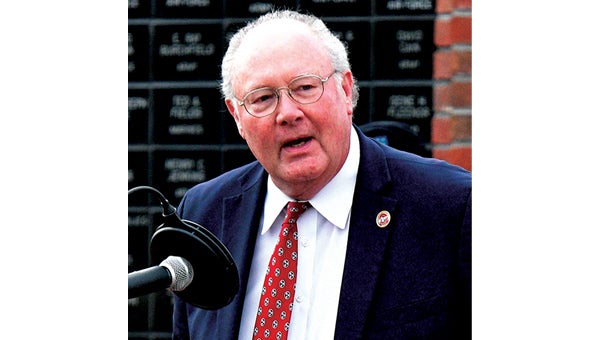State officials weigh in on Roe v. Wade ruling
Published 3:22 pm Friday, June 24, 2022

- Senator Rusty Crowe
|
Getting your Trinity Audio player ready...
|
The Supreme Court on Friday ended constitutional protections for abortion that had stood in America for nearly a half-century.
The decision by the court’s conservative majority overturned the landmark Roe v. Wade ruling, granting states the authority to set laws regarding the legality of abortions and is expected to lead to abortion bans in roughly half the states.
The ruling, unthinkable just a few years ago, was the culmination of decades of efforts by abortion opponents, made possible by an emboldened right side of the court that has been fortified by three appointees of former President Donald Trump.
It also brought praise from state elected officials.
“The 10th amendment to the constitution, ratified in 1791, says the powers not delegated to the United States by the Constitution, nor prohibited by it to the States, are reserved to the States respectively, or to the people,” said state Sen. Rusty Crowe, R-3rd District. “The ruling on Roe vs. Wade in 1973 improperly usurped the powers of the states unconstitutionally. An issue as important as the ending of human life belongs closest to the people, and should be decided by the elected representatives of the people, and not to appointed, unelected judges … this historic ruling returns this issue to the elected representatives of each state where it should have been for all these years.”
Tennessee Gov. Bill Lee also praised the decision. “Today’s landmark Supreme Court decision marks the beginning of a hopeful, new chapter for our country,” said Gov. Lee. “After years of heartfelt prayer and thoughtful policy, America has an historic opportunity to support women, children and strong families while reconciling the pain and loss caused by Roe v. Wade. We have spent years preparing for the possibility that authority would return to the states, and Tennessee’s laws will provide the maximum possible protection for both mother and child. In the coming days, we will address the full impacts of this decision for Tennessee,” he said in a statement.
The landmark ruling came in the case of Dobbs v. Jackson Women’s Health Organization, which originated in Mississippi.
Abortion foes cheered the ruling, but abortion-rights supporters, including President Joe Biden, expressed dismay and pledged to fight to restore the rights. “It’s a sad day for the court and for the country,” Biden said at the White House. He urged voters to make it a defining issue in the November elections, declaring, “This decision must not be the final word.”
Marjorie Dannenfelser, president of SBA Pro-Life America, told the Associated Press she agreed about the political stakes.
“An entirely new pro-life movement begins today. We are ready to go on offense for life in every single one of those legislative bodies, in each statehouse and the White House,” Dannenfelser said in a statement.
The ruling came more than a month after the leak of a draft opinion by Justice Samuel Alito indicating the court was prepared to take this momentous step.
It puts the court at odds with a majority of Americans who favored preserving Roe, according to opinion polls.
Alito, in the final opinion issued Friday, wrote that Roe and Planned Parenthood v. Casey, the 1992 decision that reaffirmed the right to abortion, were wrong had to be overturned.
“We therefore hold that the Constitution does not confer a right to abortion. Roe and Casey must be overruled, and the authority to regulate abortion must be returned to the people and their elected representatives,” Alito wrote, in an opinion that was very similar to the leaked draft.
Joining Alito were Thomas and Justices Neil Gorsuch, Brett Kavanaugh and Amy Coney Barrett. The latter three justices are Trump appointees. Thomas first voted to overrule Roe 30 years ago.
Four justices would have left Roe and Casey in place.
The vote was 6-3 to uphold the Mississippi law, but Chief Justice John Roberts didn’t join his conservative colleagues in overturning Roe. He wrote that there was no need to overturn the broad precedents to rule in Mississippi’s favor.
Justices Stephen Breyer, Sonia Sotomayor and Elena Kagan — the diminished liberal wing of the court — were in dissent.
“With sorrow — for this Court, but more, for the many millions of American women who have today lost a fundamental constitutional protection — we dissent,” they wrote, warning that abortion opponents now could pursue a nationwide ban “from the moment of conception and without exceptions for rape or incest.”



